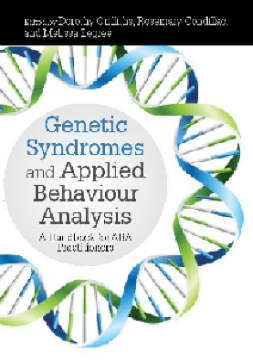
BOOK
Genetic Syndromes and Applied Behaviour Analysis
Melissa Legree | Dalena Anzivino | Sarah Ruiter | Jan Frijters | Milena Kako | Ami Morris | Dayna Taylor-Weir | Brenda Finucane | Rosemary Condillac | Sylvana Yeung | Linda Moroz | Jennifer Tysick | Dorothy Griffiths | Keeley White | Emily Moxey | Kristin Baker | Tali Amar | Joanna Cappuccitti | Tracy Billingsley | Julie Krieger | Faten Matar | Diana Kondratenko | Kerry Boyd | Jane Summers | Barbara Haas-Givler | Jeffery Hamelin | Lauren Ireland | Anne Brennan | Andrew Davis | Elliot Simon | Shelley L. Watson | Carina Gratton
(2013)
Additional Information
Book Details
Abstract
This ground-breaking resource demonstrates how genetic knowledge can influence our understanding of a child's behaviour and therefore inform their behavioural support plan. With expert advice and clear instructions, it shows exactly how to go about incorporating syndrome knowledge into ABA practice and start treating children with specific genetic syndromes more effectively. Six different genetic syndromes are covered in detail, ranging from Angelman syndrome to Williams syndrome. The book also includes general sections on genetic intellectual disability syndromes and an explanation of ABA methodology.
This will be an invaluable and enlightening book for ABA practitioners and other professionals supporting people with intellectual disabilities caused by a specific genetic syndrome from age 3 to young adult, providing the missing link between ABA and the role that genetics can play in accurate assessment and intervention.
Although our knowledge about genetic conditions leading to disabilities has increased significantly over the past decades, the field of applied behavior analysis has been slow to integrate this information into its practice. This timely book is unique in that it describes 6 common genetic syndromes and provides a thorough review of syndrome-specific research and extremely helpful advice for practitioners.
V. Mark Durand, Ph.D., Professor of Psychology, University of South Florida St. Petersburg and Co-Editor, Journal of Positive Behavior Interventions
Griffiths and colleagues have produced a book that contains a wealth of relevant background material about a range of genetic syndromes, but more importantly they have translated the implications of this knowledge into practical implications for clinicians. This book will make a positive contribution to practice for professionals working with genetic syndromes who need to know what to do with their knowledge about genotypes and phenotypes, and to behaviour practitioners who want to make a difference to children and adults with disabilities who also have identified genetic syndromes. The value of combining behavioural knowledge and research about genetic syndromes is no longer in doubt.
Richard P. Hastings, PhD, CPsychol, FBPsS, FIASSIDD, Professor, CEDAR (Centre for Educational Development Appraisal and Research), University of Warwick
Radical behaviorism, the philosophy of science that underpins Applied Behaviour Analysis, is entirely compatible with biological, genetic, and evolutionary approaches. In fact, we need a full understanding of genetics and biology in order to fully understand behavior, i.e., the interaction of the organism with the environment. For the first time in disability research, this book makes these links explicit. It is a must-read for any student of psychology or behaviour analysis.
Professor Karola Dillenburger, ClinPsych BCBA-D, Director, Centre for Behaviour Analysis, School of Education, Queen's University Belfast; Treasurer, European Association for Behaviour Analysis
This remarkable book is a unique integration of two fields of study: ABA and genetics... this timely publication marks the turn of the tide in behaviorist therapy, and where ABA leads, many others are likely to follow - perhaps even those at the opposite pole of the mentalistic continuum.
Psychology Today
Genetic Syndromes and Applied Behaviour Analysis is a welcome resource for ABA practitioners and other professionals seeking up to date information about genetic syndromes and how they can affect behavior. Taking us beyond simplistic one dimensional views of ABA and genetics, Genetic Syndromes and Applied Behaviour Analysis highlights the importance of the interaction between the unique genetic endowment and the unique environmental learning experiences of every individual. Well organized and clearly written, informative historical summaries and helpful literature reviews of innovative behavioral interventions are found throughout. The invaluable genetic background information is most useful in designing individualized educational plans that increase the likelihood of effectiveness and success. Interventions discussed emphasize positive approaches toward learning new adaptive behaviors rather than simply eliminating unwanted behaviors. I found Genetic Syndromes and Applied Behavior Analysis to be one of the most useful new books to cross my desk in recent years. This book is of great value not just to ABA professionals but to everyone working with these populations and will be at the front of my book shelf. I highly recommend this book.
Albert Kearney, clinical psychologist and author of Understanding Applied Behaviour Analysis
